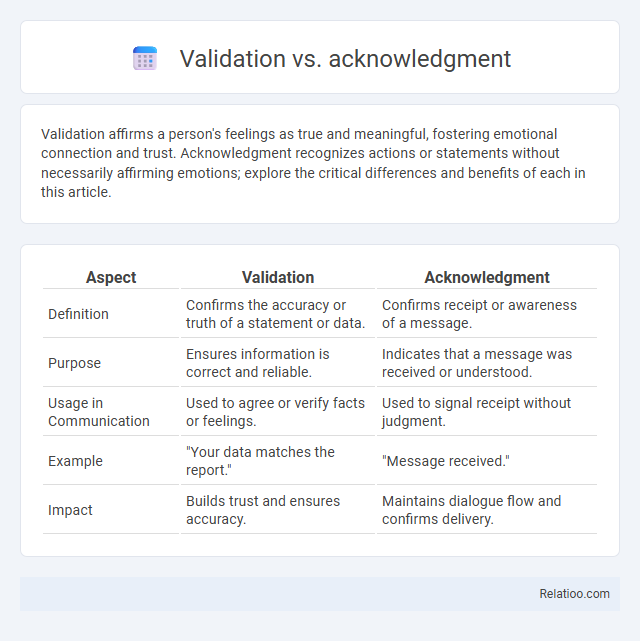Validation affirms a person's feelings as true and meaningful, fostering emotional connection and trust. Acknowledgment recognizes actions or statements without necessarily affirming emotions; explore the critical differences and benefits of each in this article.
Table of Comparison
| Aspect | Validation | Acknowledgment |
|---|---|---|
| Definition | Confirms the accuracy or truth of a statement or data. | Confirms receipt or awareness of a message. |
| Purpose | Ensures information is correct and reliable. | Indicates that a message was received or understood. |
| Usage in Communication | Used to agree or verify facts or feelings. | Used to signal receipt without judgment. |
| Example | "Your data matches the report." | "Message received." |
| Impact | Builds trust and ensures accuracy. | Maintains dialogue flow and confirms delivery. |
Understanding Validation and Acknowledgment
Understanding validation and acknowledgment is crucial for effective communication and emotional intelligence. Validation involves recognizing and affirming someone's feelings or experiences as legitimate and understandable, while acknowledgment refers to simply recognizing or noting the presence of a fact or situation without necessarily endorsing the emotional aspect. Your ability to distinguish between these can enhance relationships by ensuring emotions are properly addressed and respected.
Defining Validation in Communication
Validation in communication involves recognizing and affirming another person's feelings, thoughts, or experiences as legitimate and understandable, fostering trust and emotional connection. Unlike acknowledgment, which simply confirms receipt or awareness without necessarily agreeing or empathizing, validation conveys respect and acceptance that can reduce defensiveness and enhance dialogue. You strengthen relationships and improve interaction quality by practicing genuine validation that goes beyond surface-level recognition.
What is Acknowledgment?
Acknowledgment is the confirmation or recognition that a message, request, or document has been received and understood without necessarily implying approval or validation. It serves as a formal notice ensuring the sender that their communication has reached the intended recipient and is being processed. Unlike validation, acknowledgment does not verify accuracy or compliance but simply confirms receipt.
Key Differences Between Validation and Acknowledgment
Validation confirms the accuracy and completeness of data or processes, ensuring they meet predefined standards or requirements. Acknowledgment simply indicates receipt or awareness of information without verifying its correctness or quality. The key difference lies in validation's role in quality assurance versus acknowledgment's function as a communication or receipt confirmation.
The Role of Validation in Relationships
Validation in relationships plays a crucial role by affirming your partner's feelings and experiences, fostering emotional safety and trust. It involves actively listening, understanding, and empathizing without judgment, which strengthens connection and reduces conflicts. Unlike acknowledgment, which simply recognizes facts, validation deeply confirms the legitimacy of emotions, making your partner feel seen and valued.
The Importance of Acknowledgment in Interactions
Acknowledgment plays a crucial role in interactions by affirming the other person's feelings and perspectives, fostering trust and emotional connection. Unlike validation, which explicitly confirms the accuracy or legitimacy of emotions or statements, acknowledgment simply recognizes and respects the presence of those experiences without judgment. This subtle but powerful act enhances communication, reduces conflict, and promotes empathy in personal and professional relationships.
Psychological Impact of Validation vs. Acknowledgment
Validation involves recognizing and affirming another person's feelings or experiences as understandable and legitimate, which significantly enhances emotional well-being and fosters self-esteem. Acknowledgment simply denotes noticing or admitting someone's feelings or actions without necessarily affirming their emotional experience, often resulting in minimal psychological impact. The psychological impact of validation is profound, promoting trust and emotional safety, whereas acknowledgment may serve as a basic recognition without providing the emotional support crucial for mental health.
Common Misconceptions
Validation confirms the accuracy of data or information, ensuring it meets predefined criteria. Acknowledgment merely recognizes receipt of information without verifying its correctness, often leading to confusion with validation in communication contexts. Common misconceptions arise when acknowledgment is mistaken for validation, causing errors in data processing or misunderstanding in interpersonal communication.
Practical Examples of Validation and Acknowledgment
Validation confirms the accuracy or truth of information, such as verifying a payment in your bank account to ensure the transaction was successful. Acknowledgment refers to recognizing receipt or awareness, like receiving an email confirmation after submitting a form online. In practice, validation ensures data integrity and correctness, while acknowledgment provides proof of communication or receipt without necessarily confirming the data's accuracy.
Choosing the Right Approach for Effective Communication
Choosing between validation, acknowledgment, and affirmation is crucial for effective communication, as each approach serves different emotional needs and contexts. Validation involves recognizing and accepting another person's feelings or experiences as legitimate, which fosters trust and empathy in your interactions. Acknowledgment simply recognizes a fact or situation without necessarily endorsing it, while affirmation reinforces positive traits or actions, supporting motivation and self-esteem.

Infographic: Validation vs Acknowledgment
 relatioo.com
relatioo.com